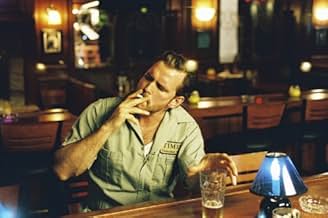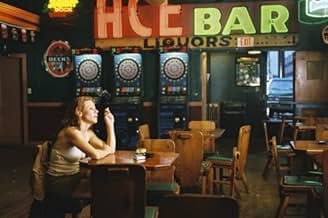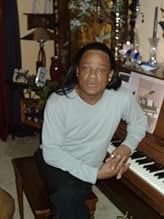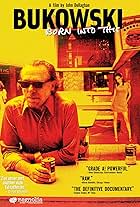Este drama se centra en Hank Chinaski, el álter ego de ficción del autor de "Factótum", Charles Bukowski, que deambula por Los Ángeles, California, tratando de ganarse la vida con trabajos q... Leer todoEste drama se centra en Hank Chinaski, el álter ego de ficción del autor de "Factótum", Charles Bukowski, que deambula por Los Ángeles, California, tratando de ganarse la vida con trabajos que no interfieran en su interés principal, que es la escritura. A lo largo del camino, int... Leer todoEste drama se centra en Hank Chinaski, el álter ego de ficción del autor de "Factótum", Charles Bukowski, que deambula por Los Ángeles, California, tratando de ganarse la vida con trabajos que no interfieran en su interés principal, que es la escritura. A lo largo del camino, intenta no dejarse llevar por las distracciones de las mujeres, la bebida y el juego.
- Dirección
- Guión
- Reparto principal
- Premios
- 4 premios y 5 nominaciones en total
- Tony Endicott
- (as Tom Lyons)
- Stripper
- (as Emily 'Sophia Simone' Hynnek)
Reseñas destacadas
Henry Chinaski is made real by the always brilliant Matt Dillon. It really is no surprise that Hollywood's former pin-up embodies the part so well, as his perfected mix of sleaze and slack minded cool have made him the renowned actor he is. From 'Over the Edge' in 1979, the award winning 'Drugstore Cowboy' and his recent role as the scarred cop in 'Crash', Dillon really has the ability to expose man's flaws and run to a bar with them.
The film is spliced from various Bukowski writings and follows Chinaski (his alter-ego) around town as he drinks from job to job occasionally taking time to get fired and get laid. Lily Taylor and Marisa Tomei play two of Chinaski's bed-pals with equal sleaze and conviction.
This is not your usual movie in terms of subject matter and execution. It takes a Norwegian director, committed actors and a fantastic performance from Dillon to pull off a story that really is as much a Homage to Bukowski but also a bold attempt to deliver something different, a word not regularly accepted in today's Hollywood run industry. (Hence some of the finance coming from Japan).
From our introduction to Chinaski's routines of getting work and drinking; then losing work and drinking to watching what is essentially a horrible man (his treatment of woman, his lack of respect for anything) we are never really meant to like him. So why do we? It isn't just the looks or square jaw of the lead (Bukowski was the complete opposite) or his fantastic humorous charm but what lies beneath those eyes. Dillon has always been able to make the jerk likable. In this case, we do because he's funny and because we get a tiny glimpse of background reasoning why this man is so talented and yet so flawed. (The real Bukowski suffered a tough childhood and Chinaski's family is only referenced to in a hilarious scene of steak and ass- you'll see what I mean ).
Bent Hamer has accomplished a feat pretty standard in European film-making traditions- light comedy with black undertones outside of the rules of the usual three part formation. This tale could have started anywhere and ended anywhere in this man's life as the selling point it simply having Dillon on screen as this character- that is the story.
Bukowski was a genius who stuck to his loose morality with his back to society. It should be noted that he held down jobs for long periods, one for 12 years while doing what he did best, drinking and gambling but the only time he truly engaged was when he was observing for his writings, looking for funding i.e. work or needed a female drink buddy. He later had works published, hung around with Sean Penn (also considered for the role) and U2 dedicated a song to him.
The cast and crew have created a delightful fresh film that is both funny and dark. The performances are as authentic as ever with a mention going to Lily Taylor's career best performance. This film is a Jack of all trades and seems to have mastered a new one with the tone and atmosphere set perfectly to mirror the down and dirty LA Bukowski became part of.
The dialog has lots of pop. Somewhat a film noir, somewhat a comic book, the film has a nice feel with the first person narration of Chinaski taking us on his tour. It could have been in black and white but is nicely filmed in color. One of those slightly rare movies as at home at a film festival (Cleveland's, in this case) or at your local theater.
Those episodes are all we get, and apart from brief writing and longer romantic interludes, they mainly concern a long round of short-lived jobs -- sorting pickles in a pickle factory, boxing brake shoes, dusting statues, driving a cab (a hard-on's no danger to the driver, the instructor says, but sneezing is), assembling bike parts, and so on, from which Hank is unfailingly soon fired for drunkenness or lateness, insubordination or other misdemeanors -- whereupon he goes back to writing, drinking, and sex -- which latter, Jan tells him, is no good when he gets successful as he does for a while playing the horses. (There's none of the post office sorting job Bukowski did for a long time.) For Bukowski and his alter ego being a seedy loser is a thing carried off with such chutzpah that it's sexy -- and drinking and sex are equally close ways to feed the libido. There are plenty of the ten-cent aphorisms the tireless writer worked at, and there's a plug for the Black Sparrow Press that eventually started to keep and publish his endlessly mailed out submissions and today still survives off maintaining the slob genius' ovre in public hands.
Bokowski appeals to the young, the easily impressed, the hard drinking, and those who like the pithy sayings and ignore the arrested development. For those of bourgeois mentality and upbringing there's a certain imperishably tonic thrill in watching a man who's been down so long it looks like up; who can tell the employer who's just fired him to give him his severance check immediately so he can hurry up and get drunk; for whom no flophouse or flat is too seedy, no bibulous girlfriend a worse drunk than he. How liberating it might be not to care about losing everything, knowing that since paper and pen are nearly free you'll never stop writing: or if you lose heart for a minute or two, a dip into the works of some other writer will encourage you in the belief that you can do better. Bokowski was a tough one.
Matt Dillon is Irish enough to have seen something of the hard drinking life himself. One senses that he knows whereof he speaks and can convey the alcoholic lifestyle without irony or melodrama. There's nothing quite like Lili Taylor coming out in her underwear to fix Hank a meal. His request is for another round of pancakes. "There's still no butter," she says. "Well, they'll be extra crisp," he replies.
In a smaller but still choice role Marisa Tomei is well disguised as another drunken lady Hank goes home with, finding that she lives with a flaky French millionaire called Pierre (Didier Flamand) with a little yacht and dreams of composing an opera. Hank's been taken off so many two bit jobs being fired has no sting left for him. Bukowski's persona is impenetrable and he's a simple survivor: he's almost utterly resistant to the forces of change his wayward lifestyle would activate in lesser beings and hence, unlike the downward spiraling drunk so movingly played by Nick Cage in Leaving Las Vegas, Bukowski's Hank in Dillon's performance cannot build toward pathos or true depth. As suggested, this film doesn't develop its sequences and relationships as thoroughly as Barfly, for which Bukowski himself wrote the screenplay, giving it a continuity and focus Factotum's more cobbled-together script doesn't quite muster.
There's something condescending and cultish in the European cultivation of the Bukowski myth in which this is another short chapter. Factotum is an occasionally amusing, at moments laugh-out-loud kind of movie that's well served by all the principals and by director Hamer's dry wit and restraint, but after the desultory and boring stretches have eventually started to pile up you may begin to say: So what? and wish the fresh novel feel of the early scenes could've been better sustained throughout. Not to fault the editing, but mightn't a native's keener ear for the rhythms of the dialogue have kept the flow going better? This is one to see if you like Matt Dillon or Bukowski; otherwise, save your time.
As a whole the film just didn't capture the feel of the Bukowski novel. It seemed too clean for some reason. The whole film just seemed a lot more tame than the literature. His writing captures this great sense of adventure, danger, and a frequent raw vulgarity. But also, it has a very artful heart to it. The movie missed this entirely, in my opinion.
But believe it or not though, I still think it's a good movie. Outside the actual interpretation of Charles Bukowski's novel, it's still fun watch, with generally good performances, and a phenomenal story to have been based on.
Essentially, this film is about the despairs of alcoholism, frighteningly brought to life by an array of simply stunning performances. Matt Dillon as Henry Chinasky is literally sweating alcohol. His face is red and swollen, he looks absolutely horrible. Once handsome but now an absolute has-been, who's sole interests are booze, gambling, sex and writing. People don't interest him at all, including the women, sex is all that interests him, if only mildly. Lily Taylor is a perfect match as his female interest and fellow barfly. But the real kudos are for Marisa Tomei in a relatively minor role but she really burns off the screen, alcohol set on fire. A real treat.
It might not be a typical Bukowski-movie, in the sense of his sometimes brash, aggressive, perhaps even typical direct American style, so fans of his work might judge this movie very differently and perhaps argue this is not the real spirit of Bukowsky put to the screen. But director Hamer handles it with such warmth, humor, sly wit and at times very sharp observations that you really shouldn't care about this. Judge it on its own merits.
Camera Obscura --- 9/10
¿Sabías que...?
- CuriosidadesOn 14 April 2005, in Trondheim, Norway, this became the first movie in the world to be shown with a 4K digital cinema projector.
- PifiasThe title screen displays: "factotum [a man who preforms many jobs]"--should be "performs many jobs".
- Citas
[last lines]
Henry Chinaski: [voiceover] If you're going to try, go all the way. Otherwise don't even start. This could mean losing girlfriends, wives, relatives, jobs, and maybe your mind. It could mean not eating for three or four days. It could mean freezing on a park bench. It could mean jail. It could mean derision. It could mean mockery, isolation. Isolation is the gift. All the others are a test of your endurance. Of how much you really want to do it. And you'll do it, despite rejection in the worst odds. And it will be better than anything else you can imagine. If you're going to try, go all the way. There is no other feeling like that. You will be alone with the gods. And the nights will flame with fire. You will ride life straight to perfect laughter. It's the only good fight there is.
- Banda sonoraI Wish to Weep
Lyrics by Charles Bukowski
Music by Kristin Asbjørnsen
Performed by Dadafon
Mixed by Magnus Torkildsen at Barracuda
Selecciones populares
- How long is Factotum?Con tecnología de Alexa
Detalles
- Fecha de lanzamiento
- Países de origen
- Idioma
- Títulos en diferentes países
- Factotum: A Man Who Performs Many Jobs
- Localizaciones del rodaje
- Empresas productoras
- Ver más compañías en los créditos en IMDbPro
Taquilla
- Presupuesto
- 1.000.000 US$ (estimación)
- Recaudación en Estados Unidos y Canadá
- 808.221 US$
- Fin de semana de estreno en EE. UU. y Canadá
- 59.212 US$
- 20 ago 2006
- Recaudación en todo el mundo
- 2.708.087 US$
- Duración1 hora 34 minutos
- Color
- Mezcla de sonido
- Relación de aspecto
- 1.85 : 1
Contribuir a esta página






























